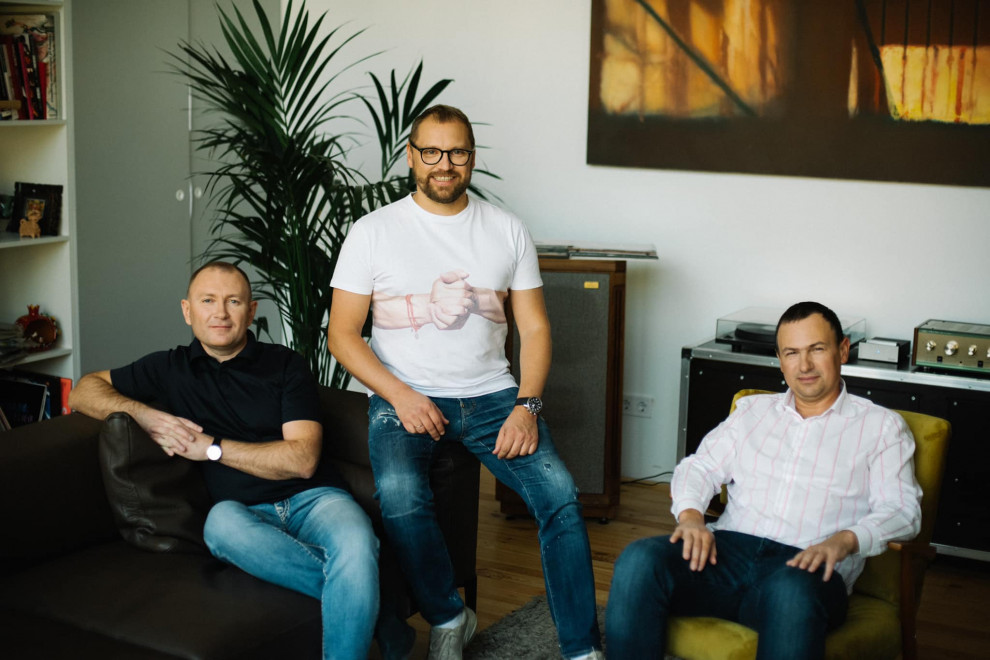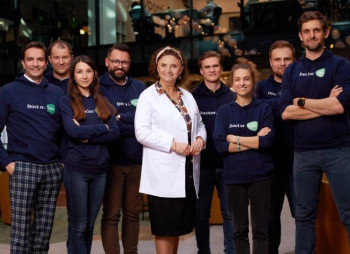While some Ukrainians are selling NFTs or organising charity concerts to support their country through the war with Russia, three well-known businessmen have opted for a different strategy.
Marketeer Andryi Fedoriv, 43, along with Volodymyr Popereshnyuk, 47, and Vyacheslav Klimov, 47, cofounders of Ukraine’s largest private delivery service Nova Poshta, have launched a VC firm called Vesna Capital — “vesna” means “spring” in Ukrainian — to invest in startups that could become the next big thing in Ukraine.
“When I see a cool startup, I want to be a part of it, to share its story and success,” says Fedoriv. “We want the new generation of entrepreneurs to be more ambitious than we were when we started our business nearly 20 years ago.”
But it’s not just good will. Vesna is somewhere between a corporate fund, a company builder and a family office — the three businessmen, who are the sole investors and equal partners in the fund, want to help cofound, invest in and potentially acquire some of the next generation of Ukrainian startups.
Long-term investors
The fund, which hasn’t announced its size, will invest $500k-1m at seed and Series A rounds — “but there are no limits really,” says Fedoriv.
“We want to create businesses in which we’d like to stay as shareholders for a long time,” he says. Vesna’s three partners want to keep investing for the next 15-20 years and say they won’t rush to cash in.
“We aren’t classic VCs who want to invest in a startup and then exit it when there’s profit,” Fedoriv says. “We aren’t financiers, we are entrepreneurs.”
Vesna has already found five startups that fit the bill and invested nearly $5m. They’re all Ukrainian, but also have customers in Europe and the US:
- The GoodPlastic Company, an eco-plastics manufacturer;
- Kooperativ, a coworking space;
- Doc.ua, a digital healthcare service;
- Salo, a video editing app;
- REMO, a developer of high-tech workspaces integrated into hotels around the world.
All of these businesses are focused on product development and profitability, rather than fundraising and quick scaling, says Fedoriv. “We want to avoid startups that promise magic in their pitch decks but don’t deliver it.”
How it all started
In Ukraine, Fedoriv is known as the “Father of Brands”. His eponymous agency, Fedoriv, has crafted marketing strategies for some of the country’s most famous companies, including ecommerce platform Rozetka, the state egovernance service Diia, Kyiv Zoo and Nova Poshta, whose founders are now partners at the VC firm.
His agency started working with Nova Poshta in 2014, when Russia first invaded eastern Ukraine and annexed Crimea. “We went through many crises together,” Fedoriv says.
The first invasion, the pandemic and now the full-scale war has taken a toll on the trio’s businesses but hasn’t discouraged them from investing.
“The launch of this fund is great news for the Ukrainian economy,” says Alexander Soroka, a Ukrainian VC based in California. “There’s little venture money in the local market right now.”
The timing for Vesna’s partners is also good, he says, as “prices are falling and the fund can invest in startups at much lower valuations”.
Investment model
Vesna Capital has three investment models: venture investment at pre-seed and seed rounds; private equity at Series A; and a company builder.
The company builder helps entrepreneurs with an idea flesh that out into a company. An example of this is coworking space Kooperativ, which Fedoriv cofounded with entrepreneurs Edward Meyor and Vasyl Grogol. Fedoriv controls nearly 90% of its shares.
Vesna’s partners like to get pretty hands-on with the startups they invest in too.
One portfolio company, the GoodPlastic Company, asked Fedoriv to help with the development of its brand. But after analysing the company’s performance, he says, he realised that what the startup really needed was to have its own factory to produce panels from recycled plastic. Vesna stumped up the cash, and GoodPlastics opened a 5,600 sq m production site near Kyiv. “Now the startup’s revenue is growing approximately three times a year; it has become profitable,” Fedoriv says.
Helping startups with business advice while running his own business is a social mission for Fedoriv. When he, Klimov and Popereshnyuk started their businesses, they didn’t attract external investment and didn’t pay enough attention to expanding beyond Ukraine. “We don’t want founders to repeat our mistakes,” Fedoriv says.
Vesna is also calling on the expertise of other Ukrainian entrepreneurs to support its startups. Dmytro Borysov, owner of the popular Ukrainian restaurant chain Gastrofamily, which operates nearly 100 restaurants in Ukraine and abroad, has already volunteered to join the Vesna board.
“Besides giving money, I could also help startups with my expertise in food retail, food tech, marketing and edutainment,” Borysov tells Sifted. Last year he invested in REMO, one of Vesna Capital’s portfolio companies.
Managing an investment fund while running your own business may seem complicated. Fedoriv’s agency employs about 100 people in Ukraine, Germany and the US, while Nova Poshta has over 27k staff. But Fedoriv, who aims to dedicate 50% of his time to the venture, says it isn’t an issue.
“I wouldn’t say the fund steals my time. No, it’s just another part of my work,” he says. “I see a lot of opportunities to create. And I can’t live without creating.”






